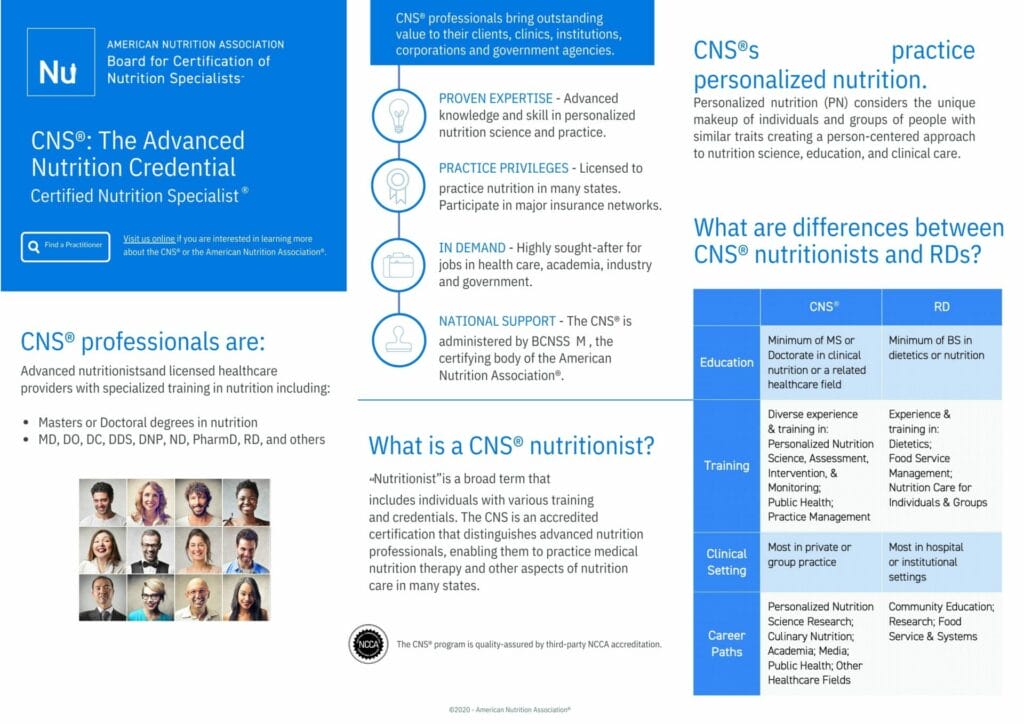

My nutrition credentials are CNS and LDN. What do these credentials mean, and how do they differ from those of an RD (Registered Dietitian)? I am often asked this question.
The credential CNS stands for Certified Nutrition Specialist. A CNS is an advanced personalized nutrition practitioner who must have a Master’s or doctoral degree in nutrition (most have a master’s degree in Human Nutrition, like me), complete a 1,000-hour supervised experience internship that achieves a set of clearly defined practice competencies, and pass the CNS exam. CNSs are required to recertify every five years and complete 75 hours of continuing education credits. Before obtaining the CNS credential, I completed my Bachelor of Science in Biomedical Science and my Master of Science in Human Nutrition.
The competencies covered in my 1,000-hour supervised practice experience (SPE) for the CNS include but are not limited to:
The CNS credential demonstrates that certified individuals have the knowledge and proficiency required for advanced professional nutrition practice. The CNS certification program is administered by the Board for Certification of Nutrition Specialists℠ (BCNS℠), an independent credentialing organization associated with the American Nutrition Association® (ANA). The ANA is the professional association for the science and practice of personalized nutrition. CNSs are qualified to provide Medical Nutrition Therapy (MNT) and advanced personalized nutrition care.
Please see the following document for more information about the CNS scope of practice.
The LDN (Licensed Dietitian Nutritionist) credential after my name allows me to practice nutrition in specific states, including Illinois, alongside my CNS credential.
While the credentials RD (Registered Dietitian) and CNS (Certified Nutrition Specialist) both signify nutrition expertise, there are some differences between the two. An RD doesn’t need a master’s degree (though this has recently changed). CNSs have the same education, if not more, compared to RDs. The significant difference is that the CNS supervised practice experience doesn’t usually include rotations in a hospital, whereas hospital rotations are common for dietetic students during their dietetic internships.
I chose the CNS route because I wanted to practice personalized nutrition, focusing on functional health. The CNS credential is the premier credential for nutrition professionals who practice personalized nutrition. The Registered Dietitian route doesn’t emphasize personalized nutrition unless one chooses to obtain additional education upon completion of their RD program.
CNSs are not as well-recognized as RDs (yet), but we are a rapidly growing demographic of highly qualified and educated professional nutrition providers occupying positions in private nutrition practice, hospitals, medical clinics, industry, and research!

I empower others through nutrition to conquer their mountain adventures, drawing from my own experiences.
With a background in Biomedical Science and an M.S. in Human Nutrition, I’m a Certified Nutrition Specialist and Licensed Dietitian Nutritionist. My journey in functional medicine has equipped me to work alongside athletes and tackle complex health cases. As a passionate trail runner, backcountry skier, and backpacker, I strive to support others on their paths to peak performance and well-being.









Sign up for updates that come right to your inbox.